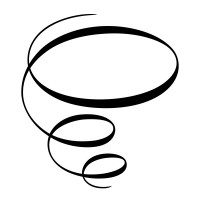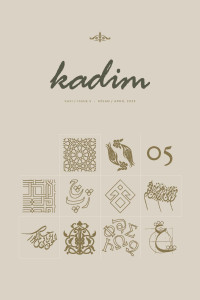Research Articles
Book Review
Meeting Report
Obituary
Aim & Scope

Kadim is committed to creating an open-access, international academic forum for scholars in the field of Ottoman Studies to share and discuss research findings. The journal encourages critical discourse by featuring academic contributions from diverse schools of thought, with the aim of enriching scholarly literature and promoting the advancement of Ottoman studies.
Kadim accepts a wide range of submissions related to the history of the Ottoman Empire and associated fields. The journal welcomes contributions in Turkish or English, including articles, critical editions, translations, book and dissertation reviews, article reviews, short reports, interviews, meeting abstracts, obituaries, biographies, and bibliographies.
Author Guidelines
Notes for Contributors

Manuscripts should be written in Turkish or English and uploaded to Kadim’s system via dergipark.org/kadim. Authors should write manuscripts with Times New Roman font style, 12-point font, and 1.5 line spacing in Microsoft Word program. The footnotes should be in Times New Roman, 10-point font, and single-spaced. The margins of each Microsoft Word page should be in the default form (2.5 cm per side). The manuscript should also include an abstract of 150-200 words in Turkish and English with 4-7 keywords below.
The article's title should be vertically centered at the top of the first page. The author's full name should follow the title, and contributors should include title, institution, email, and ORCID information as footnoted to the names (All contributors are responsible for creating an ORCID ID: orcid.org).
Manuscripts conforming to these conditions will be read by the editors for the evaluation of the content. They reserve the right to decide on the suitability of the subject matter at this step. Eligible submissions will then be seen anonymously by two referees. Contributors are kindly suggested to keep in mind that they are addressing an international audience.
Book Reviews: 60-80 words long Turkish and 60-80 words long English abstract, 5 Turkish/English keywords should be added to the beginning of the articles written in this type. Please refer to the Book Review Writing Guide (HERE).
Abstract: It should not consist of just a general summary of the article. It has to include the purpose and scope of the study, its methodology, its main sources, and its original contribution to the field. It should be 150 and 200 words long.
Extended Summary: In Turkish articles, including an English 'Extended Summary' after the conclusion is optional but highly recommended. This extended abstract should preferably encompass a range of 500-700 words and offers numerous advantages, including improved readability and increased international accessibility and citation potential. The purpose, problem, method, findings, and results of the study should be detailed in this section, which should be placed immediately preceding the Bibliography at the end of the article's main text.
Footnotes, Text Citation, and References: Kadim follows the citation system of İSNAD 2nd Edition (with footnotes): isnadsistemi.org
Reference to Archival Materials: You can find the guide HERE for citing such documents in the articles.
Transliteration: Kadim adheres to TDV Islam Ansiklopedisi's approach for transliteration. It is recommended to avoid using diacritical marks or transliteration alphabets unless required. When employing diacritics, contributors should maintain consistency throughout the text and adhere to ISNAD's transliteration system.
Similarity Check: Articles undergo thorough plagiarism screening to uphold publication ethics and prevent violations. Utilizing iThenticate plagiarism detection software, the similarity rate must not exceed 15% to ensure the integrity of the content.
Copyright: Articles in Kadim are licensed under a Creative Commons Attribution-NonCommercial 4.0 International License (CC BY-NC 4.0). Kadim adapts "Libre Open Access" Policy. It has no Price barriers and removes any permission barriers. Libre Open access to information benefits humanity as it improves the global value of information. The authors publishing with Kadim retain the copyright to their work. Kadim gives permission to copy and redistribute the material in any medium or format other than commercial purposes as well as remix, transform, and build upon the material by providing appropriate credit to the original work.
Ethical Principles and Publication Policy
Kadim adheres to international standards in research and publication ethics and has adopted the International Ethical Publishing Principles published by the Committee on Publication Ethics (COPE), Directory of Open Access Journals (DOAJ), Open Access Scholarly Publishers Association (OASPA), and World Association of Medical Editors (WAME). Authors who submit their work to the journal must comply with the ethical principles prepared by this framework.
Authorship of the Paper: Authorship should be limited to those who significantly contribute to the study. The authors of an article are to be decided before the submission, no one should be a ‘gifted’ author or denied as a ghost author.
Acknowledgments: Those (institutions and financial resources) who provide support but not contribute to the research should be acknowledged in an Acknowledgements section.
Originality and purity of plagiarism: The authors should be entirely own the submitted work. All the references in the manuscript should be cited appropriately and listed in the references. All submitted articles will be screened through iThenticate to prevent plagiarism and violations of publication ethics. The studies showing a 15% or more similarity rate will be rejected.
Ethics committee permission and approval: If the research involves human participants, the authors must claim ethical approval from an appropriate committee and explain how they obtained consent in the manuscripts.
Redundant publication: Authors are expected to submit original, previously unpublished content to Kadim. It is unacceptable to submit the work for a review to another journal concurrently.
Salami publication or salami slicing: Authors should not disaggregate the research results and publish them separately by violating the integrity of the research, and they should no present these publications for academic appointments and promotions.
Data access and retention: Authors are required to submit the raw data of their research when requested by the editors and referees and keep this data after publication.
Fundamental errors in published works: When an author discovers a significant error or inaccuracy in the published article, the author should promptly notify the journal editor and cooperate to retract or correct the paper.
RESEARCH AND PUBLICATION ETHICS FOR AUTHORS
- It is the authors' responsibility to ensure that the submitted article is of a quality that contributes to the academic field.
- The works must be original and based on research.
- Although the plagiarism scan will be carried out, it is the authors' responsibility for the academic consequences of plagiarism as academic dishonesty.
- The articles should not be sent to different journals concurrently and should not have been in the evaluation process in another journal.
- It should be made sure that other individuals shown as co-authors have contributed to the research. It is contrary to scientific ethics to add some, who are not academic contributors to the article, as co-authors or to put in order co-authors with non-academic criteria such as title, age, and gender regardless of the order of contribution.
- It is assumed that authors who submit articles to the journal read and accept the publishing and writing principles of the journal and the writers are deemed to have committed themselves to these principles.
- Citations and bibliography should be complete and valid.
ETHICAL DECLERATION FOR AUTHORS
The studies requiring ethical committee permission must mention the respective situation in the article. Researches requiring the permission of the Ethics Committee are as follows.
- Any research carried out with qualitative or quantitative approaches that require data collection from participants using survey, interview, focus group work, observation, experiment, interview techniques,
- Use of humans and animals (including material / data) for experimental or other scientific purposes,
- Clinical researches on humans,
- Researches on animals,
- Retrospective studies in accordance with the law of protection of personal data,
Additionally, it is necessary to obtain such permissions for the followings:
- In the case reports, it is stated that the “informed consent form” was taken,
- Obtaining and specifying the permission of the owners for the use of scales, surveys and photographs of others,
- Stating that the copyright regulations are complied with for the ideas and works of art used.
If the study does not require Ethics Committee Permission, please click HERE (WORD) ( PDF) for Ethical Declaration Form
RESEARCH AND PUBLICATION ETHICS FOR REFEREE
 Referees must evaluate the articles within the time frame granted to them. If they will not evaluate the article, they must notify the journal within a reasonable time.
Referees must evaluate the articles within the time frame granted to them. If they will not evaluate the article, they must notify the journal within a reasonable time.- Referees should act with the awareness that they are the most basic determinant of the academic quality of the article to be published in the journal and should evaluate it with a view to increasing academic quality.
- Referees should only accept the articles that they have the expertise necessary to make an appropriate appraisal. Also, they should only accept the articles that they can adhere to the double-blind peer-review secrecy and they should keep the details of the article in every way confidential.
- Any information about the article examined in the review process should not be shared with anyone in any way.
- Referees should only evaluate the correctness of the content of the articles and the appropriateness of the academic criteria. The opinions put forth in the article by the authors may differ from those of the referees. The differences should not affect the evaluation.
- Referee reports should be objective and moderate. Defamatory, derogatory, and accusatory statements must be avoided.
- Referees should avoid superficial and ambiguous expressions in evaluation reports. For the evaluations that resulted negatively, the missing points and imperfections of the article must be shown clearly and concretely.
RESEARCH AND PUBLICATION ETHICS FOR EDITORS
- Editors should accept the articles that may contribute to the relevant areas expressed in the scope of the Journal to the evaluation process.
- Editors should not be in any conflict of interest with the accepted or rejected articles nor take advantage of them.
- Editors have all the responsibility and authority to accept or reject a submission.
- It is the responsibility of editors to keep the names of referees and authors confidential.
- Editors should take the necessary effort to ensure that the articles submitted for publication will be scanned to prevent plagiarism, which is academic dishonesty.
- It is the responsibility of editors to complete the review, refereeing, editing, and publishing processes of the submitted articles in a timely and healthy manner.
- Editors should give priority to academic concerns and criteria when accepting the articles to the journal.
Price Policy
Kadim is committed to providing free and open access to its electronic articles without any charges or fees imposed on its readers or libraries. The journal does not require any payment for the submission, publication, or management of the submission process. It is worth noting that the journal does not offer any form of compensation to its authors for their contributions.







